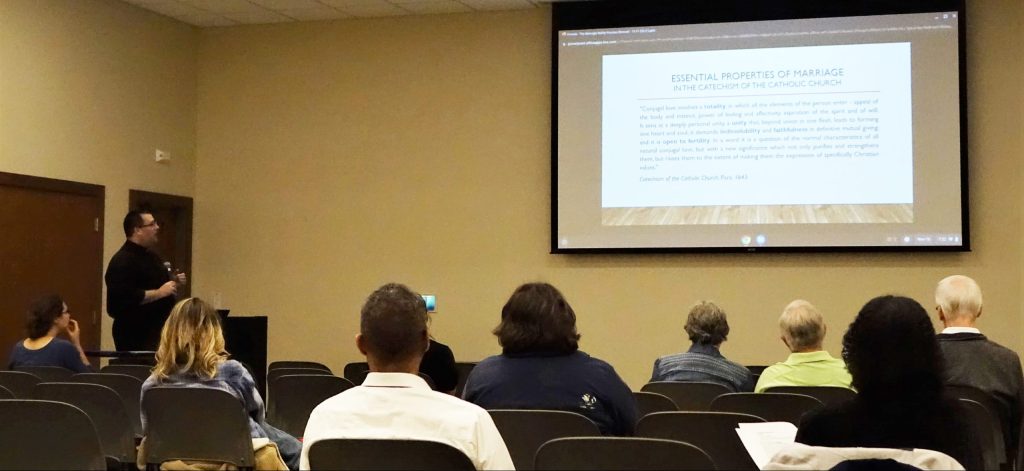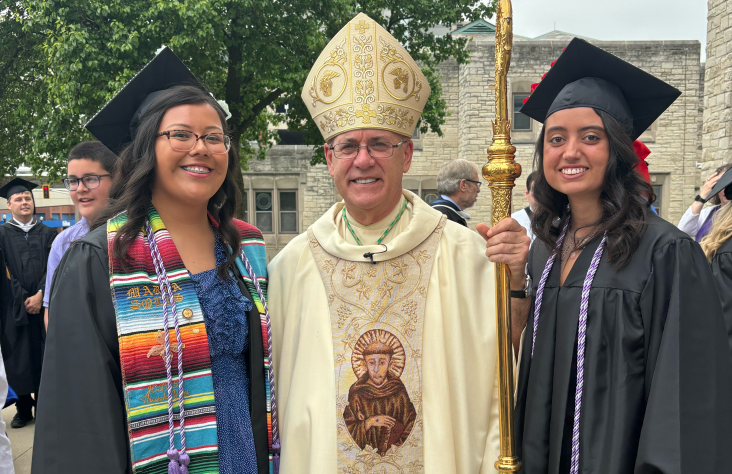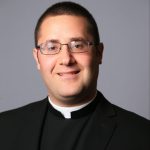November 30, 2023 // Diocese
Diocesan Tribunal Addresses Questions about the Marriage Nullity Process
Many people hold misconceptions about the marriage nullity process (commonly referred to as annulment) in the Catholic Church. A presentation on Wednesday, November 15, at St. Pius X Catholic Church in Granger intended to help fix that.

Father David Violi explains the Catholic Church’s view of marriage at a presentation on the annulment process at St. Pius X Catholic Church in Granger on Wednesday, November 15. Father Violi is a member of the Diocese of Fort Wayne-South Bend’s Tribunal. – Kasia Balsbaugh
“Most Catholics do not understand annulments,” said Father Bill Schooler, Pastor of St. Pius X. “There are those who are afraid to take the first step in filing for an annulment. We are hoping that this presentation will help people understand, especially those in second marriages or those in RCIA who need to have their former marriages studied.”
Presenters at the November 15 event were Father David Violi and Anne Therese Stephens, both of whom are advocates in the Diocesan Tribunal, which handles marriage nullity cases in the Diocese of Fort Wayne-South Bend. The role of the advocate involves guiding each petitioner (someone seeking marriage nullity) through the process.
Father Violi is a son of St. Pius X Church and currently serves as pastor of St. Joseph Catholic Church in Bluffton. He is in the process of concluding the requirements for a decree in canon law. In addition to her position in the Tribunal, Stephens is an adjunct professor at the University of Saint Francis in Fort Wayne and is working on her dissertation pursuant to a doctoral degree in canon law.
Their presentation on the marriage nullity process outlined the Church’s definition of marriage as well as the marriage nullity (annulment) process. Stephens and Father Violi also addressed some common misconceptions on marriage nullity and answered questions submitted anonymously from audience members.
“Our hope, really, at the end of this is that in the Church’s law, in canon law, you see the great love and the care for the People of God that is there,” Father Violi said.
The presentation began with an in-depth look at marriage inside and outside the Church, and in particular the Church’s view of the Sacrament of Matrimony, which the Catechism of the Catholic Church and canon law both hold to be for “the good of the spouses and the procreation and education of offspring.”
“To first start looking at annulments, we’re first going to look at marriage, because in understanding marriage then we can begin to understand the annulment process,” Father Violi said.
He added, “This whole process, the overview of marriage and the annulment process, is to do everything in our power to help couples be prepared to enter into a lifelong commitment for a happy, a healthy, and a holy marriage.”
Father Violi also addressed how sacramental marriage is different from civil marriage.
“Marriage is a covenant,” Father Violi said. “Notice it is different than a contract. This is where the annulment process is different than a divorce. A divorce is the ending of a civil contract. An annulment isn’t dealing with a contract; it’s dealing with the covenant, the kinship, the familial relationship between two persons.”
Because the Church has such a different view of marriage than the secular view, an annulment is not just a “Catholic divorce.” Stephens and Father Violi emphasized that while divorce is the “dissolution” of a union seen as a contract, an annulment is a “declaration” that the marriage covenant was never truly entered into at all.
Stephens reviewed the reasons why a marriage can be declared to never have happened. As she explained, the three potential components to marriage nullity are form, impediment, and consent. The first concerns whether proper form was followed in the public celebration of the marriage. For instance, were there two witnesses and an authorized minister? Impediment concerns whether there was some reason preventing a valid marriage, such as a familial relationship between spouses or a pre-existing marriage bond. Consent looks at the ability of the spouses to make the decision to get married – for example, was it freely chosen without force? Was each spouse intending to be faithful to the other?
Because the Church presumes marriages not proven otherwise to be valid, the overturning of such a view takes time and discernment. A marriage nullity process averages about a year in length. “The process really follows a process of a trial,” Stephens said. “It’s an authentic investigation.” Proof has to be collected, witnesses have to be interviewed, and the judge making the final call on the case – a priest with a canon law degree and usually parish responsibilities as well – has to weigh everything carefully. As Stephens put it, “The judge will basically answer to God for all the decisions he has rendered.”
Even with all this time and care going into each case, the person seeking marriage nullity is not charged a fee in the Diocese of Fort Wayne-South Bend, thanks to the Annual Bishop’s Appeal.
Stephens and Father Violi emphasized contacting your parish priest or the Diocesan Tribunal with any questions.
“We don’t take these jobs because we’re going to become millionaires,” Stephens said with a laugh. “We take this job because we love Jesus and we love His Church, and so we’re here to help you in any way that we possibly can.”
Father Violi also stressed that the marriage nullity process is not supposed to be a hurtful one. “This is not an adversarial process. The point of the process is not to point blame at any party. If anything, it is meant to be the exact opposite. This is meant to be a healing process for both parties.”
The best news. Delivered to your inbox.
Subscribe to our mailing list today.








